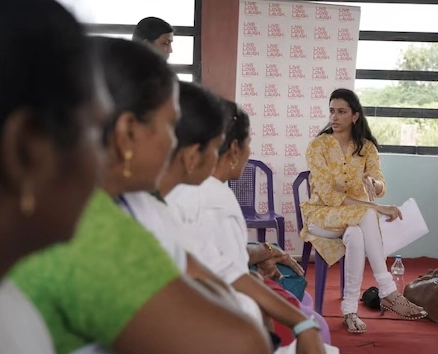
India’s mental healthcare remains deeply inadequate in rural and underserved areas despite a decade of growing awareness and policy reform, Anisha Padukone, sister of Bollywood actor Deepika Padukone and CEO of the mental health NGO LiveLoveLaugh, told News18 in an interview.
Anisha told News18 that India has witnessed a “significant shift" in how mental health is perceived and discussed, but warns that deeper systemic gaps must still be addressed.
“Studies undertaken by LLL and our experience on the ground show a significant shift in the perception of mental health in India over the last 10 years," she says. “This change has been driven by a combination of increased awareness, advocacy, and policy reform."
She says there are encouraging signs to prove that what was once a taboo subject has gradually become part of the public discourse.
“That said, stigma continues to be a significant barrier, particularly in rural India. Many still view mental illness as a personal failing rather than a health condition, which keeps people from seeking support."
A watershed moment, she said, was in 2014 when Deepika Padukone shared her battle with depression on national television. “That moment sparked a nationwide conversation and helped break the silence around mental illness… It also laid the foundation for the creation of The LiveLoveLaugh Foundation by Deepika in 2015, which I now lead."
“Stigma continues to be a significant barrier, particularly in rural India," Anisha, who is also a national-level golfer, said. “Many still view mental illness as a personal failing rather than a health condition."
Even in urban India, she believes, mental health programmes in workplaces must go beyond tokenism. “Benchmarking employee mental health benefits and workplace practices is crucial."
Talking about the work done by her NGO, she believes that through public campaigns like Dobara Poocho and #NotAshamed, LiveLoveLaugh has tried to ensure mental health conversations cut across regions and class divides. But challenges remain.
Policy Push and Gaps
The Mental Healthcare Act of 2017 has been hailed as a landmark law, decriminalising suicide and mandating insurance parity. Yet, Anisha emphasises that “the current budget allocation for mental health is insufficient to address the growing demand for care".
“Increased investment in resources, training, and infrastructure is needed. Professional standardisation is also needed, with a national body to regulate and certify mental health professionals to ensure individuals receive consistent and quality care."
Anisha, who is a member of the World Economic Forum’s Global Future Council for Mental Health, pointed out that the “mental health services are concentrated in urban areas, leaving those in underserved regions with limited access". She believes that India needs a comprehensive national mental health strategy to ensure coordinated efforts and efficient resource allocation.
“Tele-MANAS is a great start," she says, referring to the government’s multilingual counselling platform. “But we need to move from awareness to systematic, well-funded, and culturally sensitive mental health systems."
The Deepika Factor
Deepika Padukone, who founded the foundation in 2015, remains closely involved with its work through awareness campaigns, rural mental health work, and fundraising, Anisha said.
After her candid interview on national television in 2014, where she openly shared her mental health journey, Deepika established the foundation in 2015, motivated by the belief that “no life should be lost to mental illness".
“She remains deeply involved in shaping the Foundation’s awareness campaigns, programme growth, advocacy efforts, and rural mental health work—regularly visiting communities to highlight the need for accessible care," she said, recalling that her sister has led initiatives such as Dobara Poocho and #NotAshamed, championed student well-being through platforms like Prime Minister Narendra Modi’s Pariksha Pe Charcha, and brings her influence and cross-sector experience to drive the foundation’s growth, including fundraising.
What’s next?
Looking ahead, LiveLoveLaugh has three strategic goals: scale rural care, support mentally resilient workplaces, and push for policy and insurance reform. The foundation also hopes to galvanise CSR and philanthropic capital for scalable mental health programmes.
“Building on a decade of grassroots impact, LiveLoveLaugh will focus on expanding our model to thousands of rural communities," she says.
One of the more sobering takeaways is how cultural perceptions can delay or derail treatment. “Mental health challenges are just as prevalent in rural areas," she says, “but they’re often compounded by supernatural beliefs or societal shame."
Even so, she insists, interest in mental health is growing everywhere. “The need now is to bridge the gap by making mental health care more accessible, culturally sensitive, and grounded in the realities of rural life."
-
World Brain Tumor Day 2025 — Tips To Lower Brain Tumor Risk And Protect One's Health

-
India's Actions Against Pakistan Have Resulted In Simla Pact Losing Its Sanctity, Says Asif

-
President Murmu Extends Eid-Ul-Adha Greetings: 'Let's Work Together To Build Better Society'

-
Meet actor whose mother worked as domestic help, father sold coconuts, now a star, worked with Salman Khan, Rani Mukherjee, his name is…

-
Made for Rs 30 lakh, this web series has no big stars, still has IMDb rating of 9.1, beats series like Panchayat, Dupahiya in…, lead actors are…
